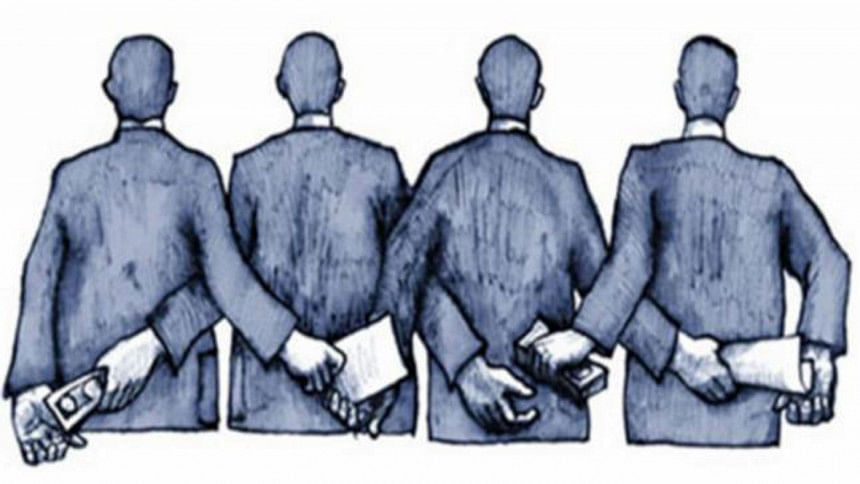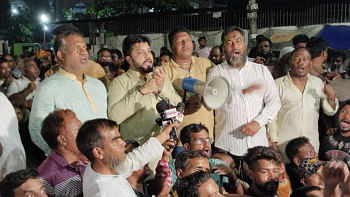The ministry of utmost disappointment

The call for defunding police in the US, after the death of George Floyd in police brutality, is one of the most striking messages coming out of what is perhaps the largest civil movement in US history. Has there ever been a call to defund a ministry? If there were, I imagine Bangladesh's health ministry would be a top contender for this "honour". To be clear, I am not actually suggesting we do that. But if you look at the endless public sufferings and protests caused by the cataclysmic failure of this ministry in the over four months of Covid-19 in Bangladesh, the idea suggests itself. Which means, in practical terms, embracing a radical approach to reform and revitalise this vital ministry so it can finally start doing its job.
That bureaucracy-as-usual is not going to cut it is pretty clear by now. The recent Regent/JKG testing scams have laid bare, once again, how corruption is deeply ingrained in the system. We've had reports detailing how the owners of these hospitals gained favour with powerful people in the government allowing them to operate without licenses, bag lucrative deals and even sell thousands of fake Covid-19 certificates. The dizzying pace at which new facts and evidence have come to the surface makes it hard to distinguish the essential from the superfluous. What I find more interesting is the rapid-fire barrage of accusations and protestations that came in response to reports that the Directorate General of Health Services (DGHS) had signed an MoU with Regent Hospital in a ceremony attended by the health minister himself and many high officials. The deal, signed in full knowledge of its lack of legal status, allowed the hospital to operate as a dedicated Covid-19 facility.
Note some of the statements that have come out since this revelation: "The MoU was signed at the direction of the higher authorities" (DGHS DG); "Countless deals are made; ministers don't read all papers" (health minister); "We have been deceived after giving contracts to Regent and JKG in good faith" (one DGHS official); "There is a syndicate that has been active since BNP's term and I tried to dismantle it but failed; ministers are helpless in the face of its dominance" (former health minister). One old video clip aired by Ekattor TV shows a boastful DG (DGHS) claiming that the ministry cannot take his job even if it wants to. Another report by Prothom Alo quotes several ministry officials who said it has no control over the DGHS partly because, they claimed, it is located "far away" from the ministry!
These statements, amusing as they may seem, reveal more than what they were intended to. They give us a glimpse into a ministry where chaos is order and order is chaos, where there is no central command and no accountability at all. It's being tied down by reckless corruption, mismanagement, inefficiencies as well as bureaucratic deadweight that wouldn't let it evolve or serve the people even at this most crucial moment. In the broader context, Regent/JKG is just another piece on the chessboard in an infinitely repeated game. They are neither the first of their kind nor the last. By now, it has become rather tiring to recall all the times a crime was exposed, either in the health sector or others, followed by customary arrests and grand promises of corrective action, and nothing came of it eventually. Each new case only makes the list longer, as new players rush in to fill the vacuum.
As we remain occupied with the dramatic capture of Regent Group Chairman Md Shahed or the fact that he faked his own Covid-19 positive report to gain sympathy from police, we are told that Regent was, in fact, borrowing from an old playbook. Actually, two-thirds of the country's over 15,000 private clinics and diagnostic centres have been running without any valid licence since 2018, hardly facing any consequences. These facilities have been providing various surgeries, medical treatment and pathological tests. It's frightening to think of the impacts of such large-scale anomalies on public health. No less frightening, especially during a pandemic, is the continued trade of counterfeit medicines, fake protective equipment, and other such corrupt practices both in the private and public sectors.
Meanwhile, people continue to die or get infected, in greater numbers than ever. According to the latest count, the number of confirmed Covid-19 cases has crossed the two lakh mark while the death toll has surpassed 2,600. The total infection rate in the country stands at 19.86 percent. When it comes to testing, among the 22 countries that have so far reached at least one lakh infections, Bangladesh has the lowest level of testing. On July 18, only 10,923 samples were tested. How do you explain such a number in a country of over 160 million? Calls for addressing our progressively decreasing testing capacity, as for widening access to treatment for those infected as well as the general patients, have gone largely unheeded. Nothing seems to be working as it ought to. While a few old guards are still in place, serving the people as best as they can, they risk coming undone in the absence of proper leadership.
But how long before we realise that this cannot go on? How long before we reform how the system governing the health ministry and its departments works? How long before we understand that going after a few corrupt individuals and officials only without dismantling this system, which enables or creates or sustains them, will never uproot corruption? Or should we stop having such "juvenile" asks from an administration where the weather is an eternal free-for-all, with deeply connected layers of corruption, confusion and lawlessness?
A shift in existing policy is urgent and long overdue. The old spheres of influence that have held back progress in our health sector must be dismantled. Old policies and strategies that have proven to be unscientific must be discarded. Given the health emergency and given its life-endangering potential, corruption must not be tolerated. And those who have consistently failed us in these past months must make way for those who can deliver.
Involving health experts in the decision-making process of the health ministry by creating high-level posts for them and granting them appropriate authority would be the most logical step forward. These people will basically make policy decisions and lead Bangladesh's overall Covid-19 response, while a handful of skilled bureaucrats will help them and coordinate with other sectors as well as do regular official work. This will not, of course, solve all our problems. But it may give us a radical new start that is essential for our fight against Covid-19.
Badiuzzaman Bay is a member of the editorial team at The Daily Star.
Email: [email protected]

 For all latest news, follow The Daily Star's Google News channel.
For all latest news, follow The Daily Star's Google News channel. 



Comments